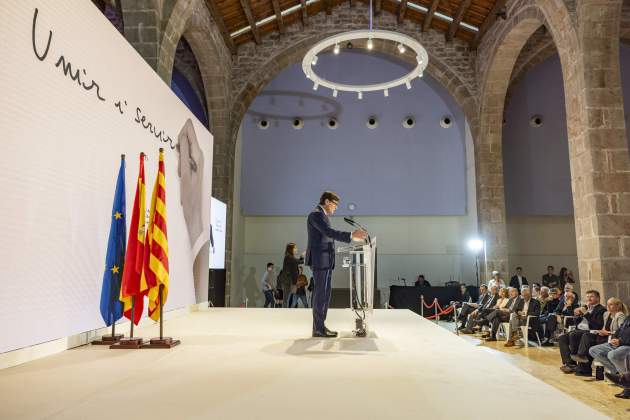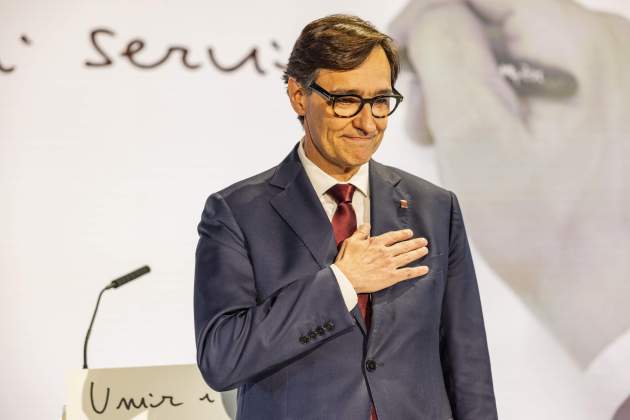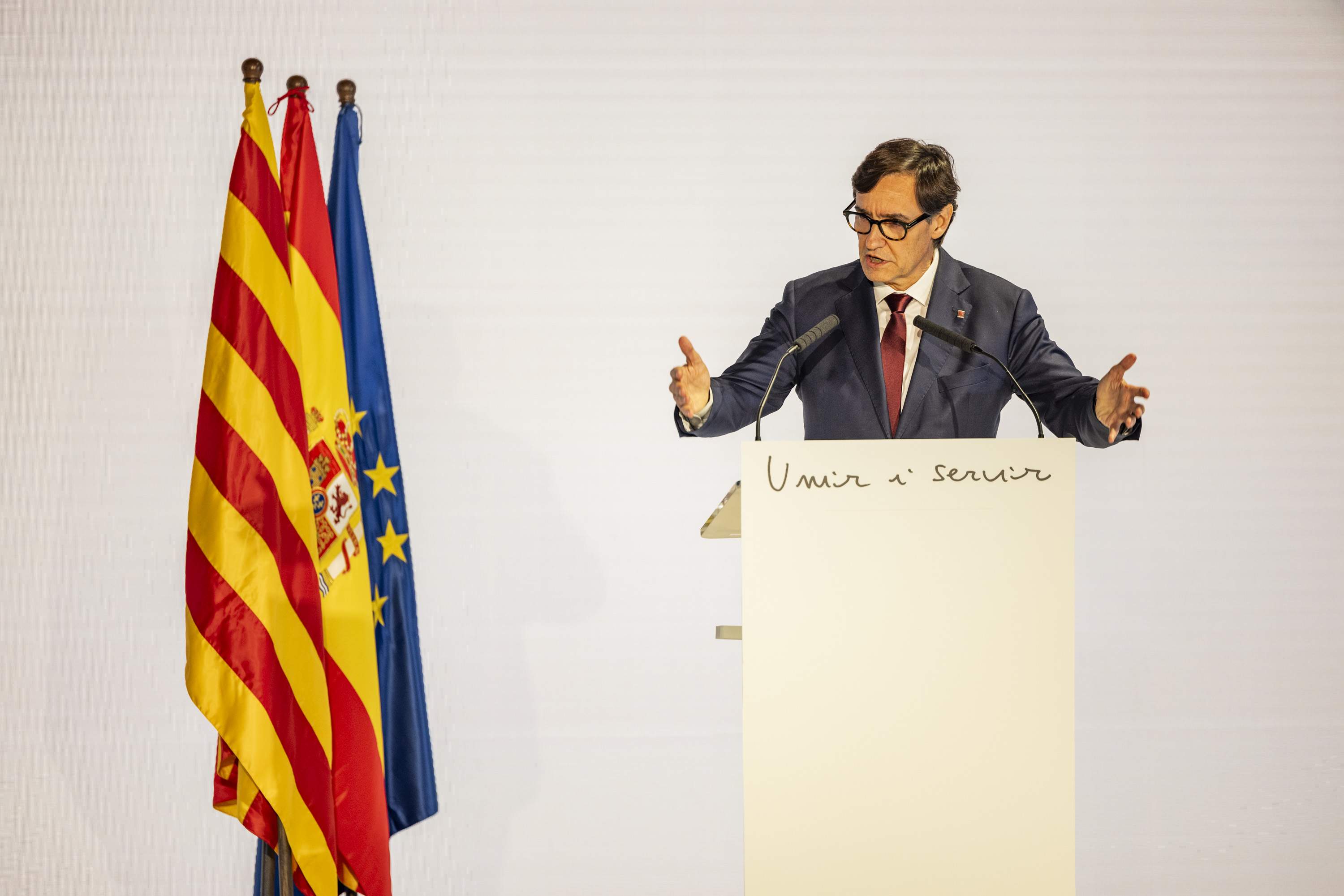A grand unfolding of a road map which the Catalan Socialists (PSC) hope will lead them to Barcelona's Generalitat palace. The party's candidate for the May 12th Catalan election, Salvador Illa, before an audience of more than 1,200 people and representatives of diverse sectors of society at the Barcelona Maritime Museum, has presented the country model he proposes and wants to implement if he is elected president. On Thursday night, the current leader of the opposition in Catalonia put forward his proposal to "unite and serve" for a third "great social transformation" that puts social services as the top priority in a context of a "change of era" requiring "significant political decisions". As part of this, Illa pledged to create a self-government commissioner who will report to the presidency if he is elected head of the executive, who will have the job of conducting an audit of public services over the last ten years, with the aim of knowing "where we are and where we have to go". At the same time, the PSC first secretary defined as one of his main lines the "consolidation, improvement and expansion of self-government", a financing in which he defends the xx tax consortium and respect for the principle of ordinality and, as a first measure, a decree to combat the drought, endowed with 3.5 billion euros.
Throughout his speech, Salvador Illa affirmed that we are at a "turning point in history, which is manifested along four axes: geopolitical, economic, climatic and technological". Given this framework, the Socialist indicated, Catalonia "has lost a decade", and to "reactivate" it, he advocates for a third major transformation that will take place within the framework of a Europe that "walks towards a federal horizon", where to be there "you have to be part of Spain and the country has to commit itself to become better, more plural and diverse and to see Spain as a source of enrichment". Appealing to the party slogan of 'Unite and serve', Illa maintained that "at a time when Spain is generously extending its hand to Catalonia, we cannot remain on the sidelines". In fact, the PSC candidate postulated that Catalonia must leave behind the attitude of "confrontation" and commit to "collaboration". "The country and its people work, the people have drive and there is energy. I offer myself and commit to leading the third great transformation, the best Catalonia is yet to come," he said. Regarding the government he proposes, he has indicated that he wants it to be above "ideologies and parties" and to defend political Catalanism.

The third great social transformation
Before delving into the details of the third major transformation, the PSC first secretary recalled what the other two were: the first, between the 70s and 80s, which served to "recover and deploy the self-government of Catalonia, the potential of the municipal world and the provincial councils". He highlighted the leadership of Jordi Pujol at that time and the "very important role" played by the Socialist political space: "At that time, Catalonia did not turn its back on the transformations that Spain was experiencing", he stated, recalling the role of two [Catalan] "fathers of the Spanish constitution", Miquel Roca and Jordi Solé Tura. Regarding the second, Illa emphasized that it was during the first decade of this century, under Socialists presidents Pasqual Maragall and José Montilla, and consisted of "the expansion of the social sphere".
Now, according to Illa, it is time for this new transformation, based on the prioritization of public services: "These last ten years have not been well used. The balance sheet is not good. We are facing the most severe drought in a hundred years and we are not prepared, education policies are now at the tail end of the rankings, we have not been able to expand and update our infrastructures, we are stagnant in renewable energy. Now we need public services that generate prosperity, and which are territorially and socially cohesive for the country."

The keys to financing: the deployment of the Statute
During the course of his address, the Socialist leader stressed a policy of "outstretched hand" and understanding: "Catalonia has progressed when there have been agreements". For this reason, he maintained that one of the first transversal agreements that must exist is in the field of financing. On this question, Illa revealed "three premises and five theses". Regarding the former, the head of the Catalan opposition believes that in these last ten years "no progress has been made" in funding because "we have not participated in discussion tables". At the same time, he has distanced himself from singular funding proposals for Catalonia, since he considers that "viable and realistic" initiatives are needed: "This does not mean that we are not ambitious, but we need to keep our feet on the ground, and we cannot use our need - which exists - as a permanent excuse for not being self-exigent or not doing the work that we should do."
It was then that Salvador Illa referred to the Catalonia's 2006 Statute of Autonomy to detail his model: "First, a much more efficient management of our own resources is needed, it is not understandable that in the middle of a drought the remaining treasury of the Catalan Water Agency is worth 500 million euros or that there is a deviation of 2,400 million euros from a budget". From here, he urged the "deployment of self-government", recalling that the Statute foresees the creation of a joint tax consortium between the Spanish and Catalan treasuries "which has passed the filters of the Constitutional Court": "Why don't we take advantage of that?", he asked. Later, Illa appealed to the Spanish government to fight tax dumping between the autonomous communities: "Catalonia must raise its voice and work effectively to correct this".
Beyond the tax consortium, the Socialist leader referred to "the principle of ordinality", stressing that he does not agree with the fact that Catalonia is ranked third in contributing resources to the Spanish state and the fourteenth in terms of receiving them: "Everyone understands this, any top representative of any territory in Spain would defend that this is not fair." But, apart from solving this grievance, Salvador Illa stressed that he wants "better financing" to "generate more prosperity and reduce inequalities": "I want a social financing agreement".
Self-government, drought and administration reform
To put public services at the forefront, Salvador Illa believes that it is necessary to know where they are. For this reason, he announced that he will create a self-government commissioner whose first task will be to conduct an audit of public services over the last decade: "It is not about going against anyone, but about knowing where we are, what has happened and what we ara going to do". Another commitment has been the announcement of an special decree to attack the drought, with an amount of 3.5 billion euros, which will be the first measure he adopts if he is president: "We need an action plan in the hands of municipal councils in the short term, and to build infrastructures to improve irrigation, desalination and water regeneration in the medium term". In addition, he advocated an "upgrade" of airport, port and rail infrastructure.
Still regarding self-government, the head of the Socialist list for the 12th May election calls for reforming the Catalan administration with the aim of reducing its bureaucracy. In relation to Catalan institutions, Salvador Illa wants to "recover their prestige" through the "consolidation, improvement and expansion of self-government". Once again, the first secretary of the PSC referred to the Statute - this time stating that the Generalitat has exclusive competence in fourteen areas - including passing its own electoral law or a hunting law - and fifty more that it can reach agreement on with the Spanish government through transfers "in the current legal framework".

